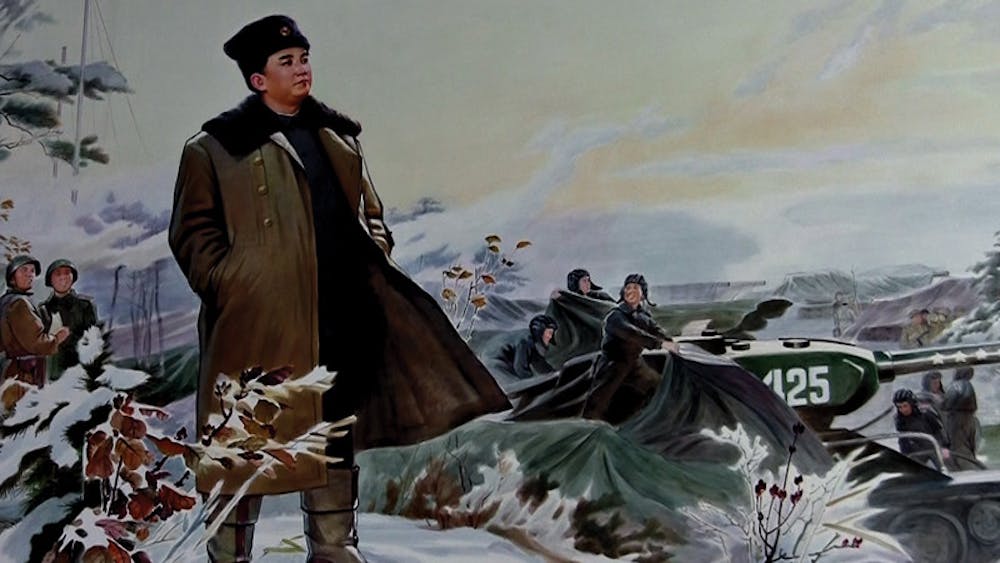Western relations with North Korea have long been fraught, with multiple American citizens having been held captive in high-profile cases and State Department officials repeatedly being denied entry to the country. But, as an alum’s recent documentary demonstrates, American civilian access to the country is not unheard of.
Students and alums routinely engage with East Asia’s most conspicuous dictatorship. “Juche Strong,” a new short-form documentary by filmmaker and one-time Herald opinions columnist Rob Montz ’05, addresses what Montz sees as “profound misconceptions” among Westerners about the Kim regime and its official propaganda apparatus.
If standards of living are as poor and civil liberties as restricted as popularly perceived, Montz asks in the film, why aren’t more refugees crossing the Yalu River into China? Part of the reason, he said, is Juche, an official state ideology of North Korea. Juche can be roughly translated as self-reliance and demands North Korean exceptionalism and isolation from the international community. American attitudes that satirize the regime as absurd or nonsensical underestimate the social and cultural resonance of the ideology in the Korean public at large, he added.
“[Juche] basically gets nothing but scorn from … casual Western observers, but it plays a pretty vital role in keeping the country running and enabling the regime to continue to extract sacrifice and cultivate a sense of shared solidarity,” Montz said.
The ideology is specifically linked to the religious and family structures of Korean people, Montz said.
“One essential aspect of it is … the Confucian family structure, the idea of dynastic succession of Korean monarchs,” he said.
In his film, which includes footage from his 2012 visit to Pyongyang in addition to interviews with scholars and one North Korean refugee, Montz attempts to understand how the country has resisted collapse despite the persistent anemia of the collective economy, according to the film’s website.
“If there had not been such a well-manufactured and deployed national ideology that could give millions of North Koreans some sense of greater purpose, some way to frame their suffering … there’s a good chance you would’ve seen some sort of concerted political uprising,” Montz said.
But Juche is only a small part of Korean identity politics, said Matthew Reichel ’09, who has visited the country over 30 times as the director of the Pyongyang Project. The project, which Reichel co-founded with Nick Young ’09 after graduating with concentrations in international relations and East Asian studies, brings Westerners into the country to travel on state-sanctioned visits and to participate in humanitarian programs with North Korean citizens, The Herald previously reported.
“I don’t think that Juche is really a center of North Korean identity as much as being Korean is a center of North Korean identity,” Reichel said. “People from North Korea have struggled for over 60 years to claim legitimacy over what it means to be Korean, and they have … very different interpretations of their own national history.”
In reference to the scarcity of refugees from the country, “The reality is, they’re Korean. That’s where they’re from, that’s where their family is,” Reichel said.
Chris Heo ’14, a member of the Korean American Student Association on campus, traveled to North Korea with the Pyongyang Project in 2011 and interned with the organization last summer.
“There’s a lot of people who secretly harbor very liberal thoughts, and I met them in North Korea,” Heo said. “They can’t say anything because they’re being monitored — they care about their family more than they care about voicing political dissent.”
Montz, Recihel and Heo all said North Koreans consume far more foreign media than intended by the regime and have increasingly gained access to outside perspectives in recent years.
“You’d be hard-pressed to find somebody in Pyongyang who has not seen a foreign movie,” Reichel said.
“When you get together with them and you have some really terrible Korean vodka and you start talking about things, they talk about the same things that basically everyone talks about, which is not the glories of the Kim Il-Sung family,” Montz said.
The film received funding from The Moving Picture Institute, a production company founded by controversial human rights advocate Thor Halvorssen Mendoza and dedicated to “promoting liberty through film,” according to the foundation’s website.
Montz, who worked for The Cato Institute after graduating from Brown with a concentration in philosophy, said his libertarian beliefs in the context of the American political system sparked his interest in North Korea.
“[Juche]touches on some basic cognitive structures that are inherent in all people,” Montz said. “I think there’s a lot of pernicious political rhetoric regularly deployed by major political parties in America that is equally stupid and base.”

ADVERTISEMENT




